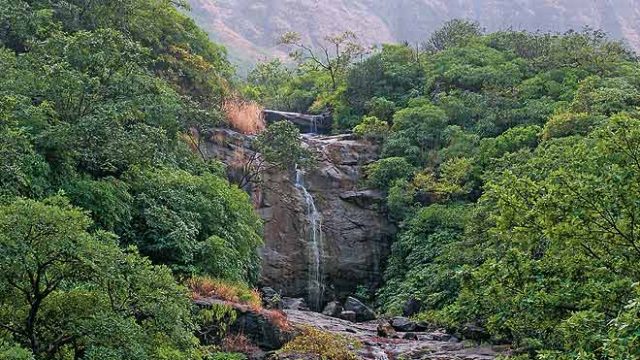Fast facts
State: Maharashtra
When to go: June to September during the monsoons, when the waterfalls are in full spate
Tourist Office: MTDC Mumbai
Tel: 022-22044040
Web: maharashtratourism.gov.in
STD code: 02132
Getting there
Rail: Nearest railhead is Kalyan (82 km/2 hrs)
Road: NH3 to Bhiwandi; SH to Malshej Ghat via Kalyan, Saralgaon and Vaishakhare
About midway down the state highway to Malshej Ghat, Mumbai and everything it stands for vanishes and the ethereal beauty of the surrounds begins to assert itself. You don’t need a signboard pointing out the route to paradise; you will know you’re there when you reach Malshej Ghat. As the car enters a short regular-looking tunnel, little do you expect that it’ll emerge at the other end to reveal waterfalls cascading down the misty mountain tops.The drive up to Malshej is marvellous, but the first view of the back waters of Pimpalgaon Joga Dam will take your breath away.
Malshej Ghat is a wildly beautiful mélange of towering peaks and bottomless valleys, home to a hundred different kinds of flora and fauna, and mountain air so fragrant and pure, you wish you could capture the scent and take it back home with you. Miles upon miles of meadows neatly stitched into a huge quilt of varying greens, the peaks hiding behind mists and blue-grey monsoon clouds all vie for your attention.

Things to see and do
Perched on the very edge of a plateau, the MTDC hotel here, managed by a private party, is gifted with the best location. Merely 160 ft away from its restaurant, in the hotel’s very backyard is land’s end. The topography changes dramatically as the plateau drops suddenly into a steep valley. You can walk to the edge and peer down the gorge, but do be careful where you step.
As you trek up the hills, you can see a giant waterfall that rises up majestically into the air instead of falling down into the valley – a water-rise! Such is the force of the wind in some parts of the mountain heights that water falling over the peaks is forced back over them in what seems like brilliant bursts of crystals, which shower down on you with icy splendour.

On the Run
Malshej is home to a variety of nature’s amazing creations the giant Indian squirrel and the giant Asian moth are among the more famous ones. However, wildlife enthusiasts planning on visiting the Narayangaon-Malshej belt must tread here with caution. The thick forests of Malshej and Junnar have for long been the natural habitat of leopards. With the human populace now encroaching into the forests and the consequent drying up of natural food sources, these magnificent cats have started coming out at night from the lush sugarcane fields and into villagers’ backyards to make meals of their cattle over the last couple of years. The Forest Department has in the past nabbed some leopards and packed them off to the Melghat Tiger Reserve. When travelling through this belt, do make sure that you are not out after dark in thickly wooded areas or fields, and be careful when travelling on two-wheelers because you are more vulnerable to attack.
Lenyadri Girijatmaka Temple
Lenyadri village in Junnar Taluka, 35 km from Malshej Ghat, houses the holy Girijatmaka Ashtavinayak. The drive itself is a wonderful experience, most of it on a dirt track with sugarcane fields on either side and later through a canopy of green formed by giant Eucalyptus trees. The first sight of the Lenyadri Vinayak temple, perched high up on one of the Sahyadri range’s majestic peaks is phenomenal, to say the very least. What you can see from ground level is an entire face of a mountain in which Buddhist monks carved caves (dating as far back as the the 3rd century) for their monasteries. One of the caves came to be the home of the Girijatmaj Ganpati. The temple itself has been declared a national monument. You have to walk up 307 winding stone steps to reach the temple in the cave, frequently stopping to catch your breath. Be warned that it is a tough climb. Should the climb up to the temple work up a huge appetite, you can tuck into the Maharashtra thali at Hotel Girija in the foothills: a typical no-frills meal that includes varan with rice, chappatis, usal, pickles, papad and sweet-and-sour chhaas.
Where to stay
Flamingo Hill Resort (Cell: 08879222031; Tariff: INR 1,750-3,800, with meals, tea/coffee and snacks), an MTDC property is beautifully located. The signboards around the hotel are chiefly prohibitory, such as, No Parking, No Entry, No Left Turn, but at least it affords a comfy stay in Malshej, with bonfires, a children’s play area and games.
Sushant Holiday Resort (Cell: 09860146030; Tariff: INR 2,000-4,700; sushantmalshej.com), facing the dam, is another option. It has 20 rooms and a restaurant and bar.
Where to eat
MTDC’s Flamingo Restaurant serves the regular local Maharashtrian cuisine like varan bhat (dal-rice), usal pao, misal pao, etc apart from Chinese, Punjabi, South Indian and Gujarati meals. Sushant Resort’s restaurant also serves pretty average local food, and regular Indian and Chinese fare.




